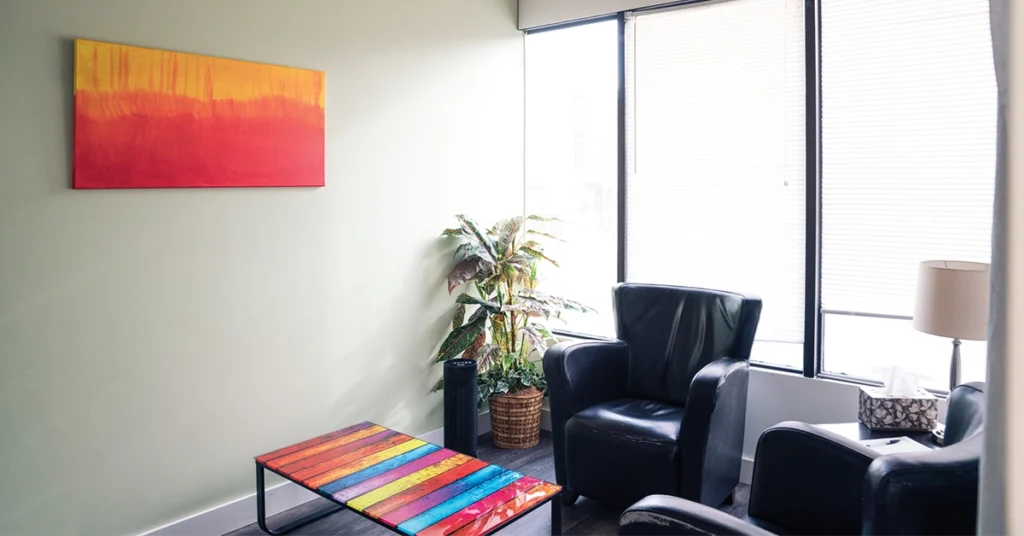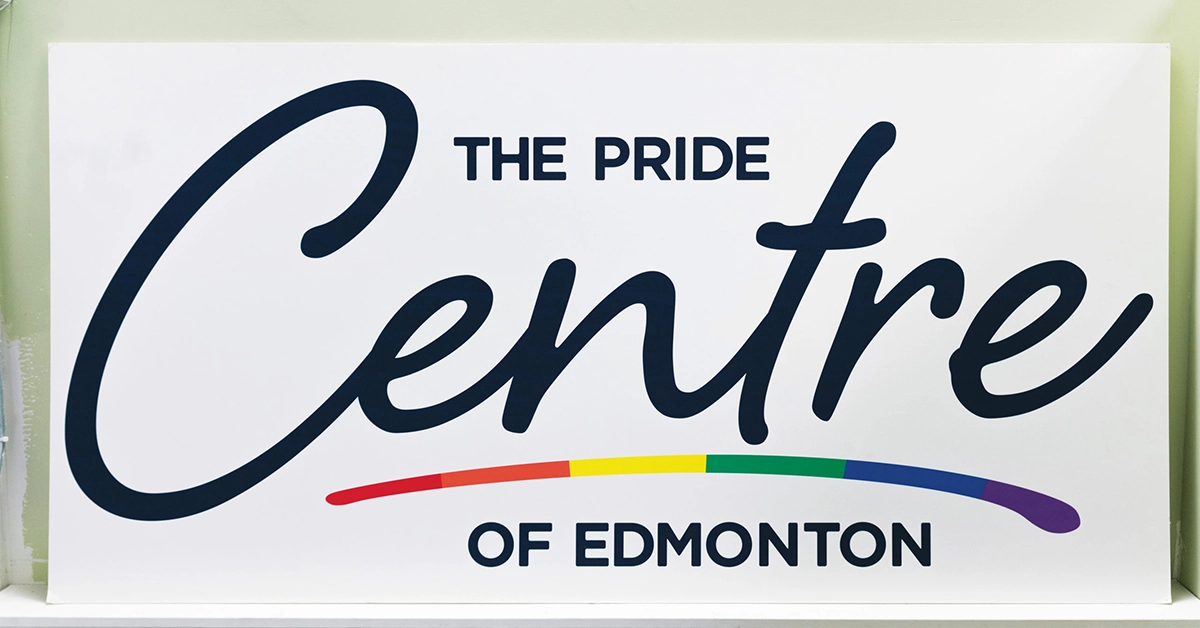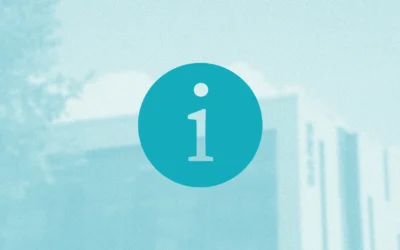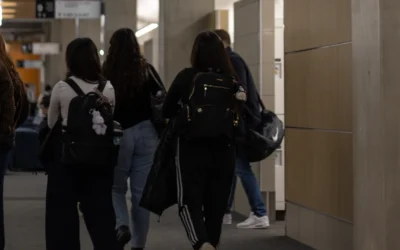With a larger space and a new look, the Pride Centre of Edmonton is now better equipped to serve LGBTQ+ communities. The organization, a community service centre and practicum partner with MacEwan University’s department of social work, recently moved into its newly renovated space behind the university on 105 Avenue and 105 Street. The renovations tripled the centre’s size, allowing it to better help the people in our communities who require its services.
Focused on sexual orientation, gender expression, and gender identity, the Pride Centre primarily serves people in LGBTQ+ communities and their families. It teaches service providers, social workers, and corporations about sexual and gender diversity, and it supports individuals who are transitioning, coming out, or facing issues related to sexual and gender diversity. It does this by connecting people to various service providers and facilitating a number of support groups for LGBTQ+ individuals and their loved ones.
Kristy Harcourt, acting executive director at the Pride Centre, explains that the staff aims to “make the world safer for queer and trans people through social support, through individual support, and by reducing barriers in the community.”
One of the great things about the Pride Centre is that it operates as a community centre. This means people don’t have to become clients in order to access services. The framework and atmosphere of the centre allow service users to engage with service providers as equals, a dignity that is not always given to individuals and families seeking these amenities.
Harcourt explains that “often people come to us feeling very unique, and very stigmatized, and when they come here they are the norm.”
A wide range of peer support groups are run through the centre. These programs are varied, and the Pride Centre is the only service provider in the region that provides programs accessible to people of all ages. In addition to these peer support groups, the Pride Centre offers free drop-in counselling two days a week, as well as community-based youth programs, like gay-straight alliances, in Leduc, Stony Plain, and at the Millwoods Public Library.

All of these programs can run more smoothly now that the renovations at the Pride Centre are finished. The new space is sunny, open, and warm. It also includes three programming spaces instead of two, as well as a kitchen and basement. Harcourt says the addition of a second counselling room has also been a huge asset in assisting service users.
“We have two counsellors here now because we have two counselling rooms instead of just one. So our use of counselling here increased over 72 per cent from last year … It feels like the centre grew up and we’re ready to serve our community in a really warm way.”
However, the Pride Centre is more than just a dedicated community centre. MacEwan’s department of social work uses the Pride Centre as a practicum site to teach students about the issues facing LGBTQ+ communities and how to use sensitivity and subtlety while working with clients.
Students completing their social work diplomas or bachelor’s degrees here at MacEwan are placed at a range of government and non-government organizations. Other placement sites include Child and Family Services, HIV Edmonton, and Bissell Centre, to name a few.
Kathaleen Quinn, director of the school of social work at MacEwan, says the students in the social work program often “choose social work because they have a big heart. They care about social justice. They want to make a difference. That’s what defines our students, and they usually have an area that they want to work in.”
For some, that area is the LGBTQ+ community.
“The Pride Centre is the focal point in Edmonton for many LGBTQ issues, for the youth who can go there and feel safe, right through to their seniors drop-in programs,” Quinn says. “Our students go there, they get exposed to the centre, they get exposed to the people who go to the drop in, they sit in on counselling sessions, they watch the groups, they are out in the community, and generally they also do a bit of a research project as well.”
“Often what creates change for people is not just listening to them kindly, but actually creating a world where they
are safe.”
—Kathaleen Quinn
Olivia Dillon, a MacEwan social work student who did her practicum at the Pride Centre last year, describes the facility as a “very fun and relaxed environment.” She also says that her practicum gave her the opportunity to take control of her learning and expanded the topics she wanted to focus on.
“When we send people to any agency, but LGBTQ agencies maybe the most, people think that they are going to work with youth,” says Quinn. “Then they find out that they are going to work with people across the lifespan, from youth to older people, and with parents as well. Then they find out that they also have to work with the community.”
Dillon agrees that she was surprised to “come across the issue of (LGBTQ+) seniors and the oppression they can face on a regular basis.” She explains that it became “a real area of interest,” so much so that she focused her final project on
the topic.
She also says that she has found it really rewarding to make connections with others in the LGBTQ+ community, and to be “able to help someone in a difficult situation get the resources they need, or to be the person someone is comfortable enough to be vulnerable with.”
Students doing their placements at the Pride Centre learn to support people individually, as a group, as a community, and also politically by being involved in discussions about laws that recognize and support the rights of LGBTQ+ individuals.
Quinn’s explanation of the importance of this involvement closely echoes that of Kristy Harcourt. “Often what creates change for people is not just listening to them kindly, but actually creating a world where they are safe,” says Quinn.
Quinn and Harcourt express similar sentiments regarding the learning outcomes of students doing their placements at the centre: it is of the utmost importance that students learn to use proper pronouns, and to make people from all walks of life feel safe, welcomed, and respected. Quinn explains that often it can take time for students to learn to put together theory and practice, and that even tasks that appear simple, such as actively listening without offering advice, are not always as easy as they may seem.
Harcourt also believes that the Pride Centre provides placement students a unique opportunity.
“For the students that do their placements here, we are able to offer them depth … They can ask us all of the questions that they want to ask. They can explore,” she says.
Dillon echoes that this is exactly the kind of opportunity that a practicum at the centre gave her. “They have dedicated staff members who believe in what they are doing for the (LGBTQ+) community and are more than willing to assist students in what they are wanting to learn,” she says.
Dillon advises students doing a practicum at the centre to “get involved in the community events and the programs they provide. Don’t be afraid to pick the brains of the staff members and don’t be afraid to ask questions.” She adds that “the more you get involved, the more you’ll take away from your experience there.”
In addition to student placements, the social work department recently worked with the Pride Centre to develop a course on gender and sexual diversity.
Quinn says extensive research was done in creating the course, and the department of social work brought the Pride Centre in as an external expert to “keep eyes on” the development of the course. They did this to ensure that the course reflected “proper terminology,” as well as a better understanding of the issues that are currently affecting LGBTQ+ individuals and communities. Quinn and the department of social work also wanted to understand how they, as course developers and instructors, “might get in the way of practice.”
Harcourt says that this is just part of the Pride Centre’s involvement in their community.
“We have had a lot of talk with social work to ensure that LGBTQ students have a positive experience, but also so that all students come away with a sense of affirming queer and trans communities as part of their jobs as social workers,”
says Harcourt.
One thing is for sure: the renovations at the Pride Centre of Edmonton are the beginning of an exciting new chapter for service users, providers, and social work students alike.
Photography supplied.





0 Comments